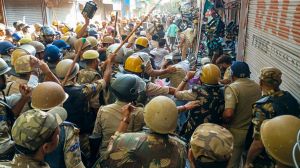Our Homeless Neighbour
In the opening essay, Jaffrelot focuses on the central dilemma afflicting Pakistan: an identity crisis. Picking his cue from an editorial in...

| Pakistan: Nationalism without a Nation? Edited by Christophe Jaffrelot Zed books; Price not mentioned |
The mostly European writers of this volume on Pakistan suffer from the dilemma of the classic outsider: distance provides perspective but politeness prevents brutally honest observations. So although their questions are sharp, the answers barely scratch the surface of the problem. While the analytical issues raised are probing and critical, almost begging a searching and scathing indictment, the conclusions are oddly optimistic and rather misplaced.
Notwithstanding this central weakness, the germ of the idea is, simple yet powerful. Since its creation Pakistan has desperately searched for an identity, a search that has yielded a nationalism without the positive identity of a nation. The Paris based Christophe Jaffrelot, after writing The Hindu Nationalist Movement and Indian Politics, 1925 to the 1990s, has shifted his gaze towards Pakistani politics.
The book is divided into three parts: the failure of the Islamic state, the regional tensions; and the projection of nationalism via foreign policy. While Jean-Luc Racine lays out the pitfalls of an ‘India syndrome’ that leads Pakistan to impose a heavy military burden on itself, Sumit Ganguly analyses the Islamic dimension of the Kashmir insurgency and Pakistan’s obsessive support to the ‘‘Mehmaan Mujahideen’’. By clarifying the dynamics behind the Shia-Sunni hostilities, Mariam Abou Zahab explains the regional dimension of the sectarian conflicts in Pakistan while S V R Nasr and Saeed Shafqat by focussing separately on the Taliban and the Lashkar-e-Toiba respectively, delightfully analyse the resurgence of conservative militancy. Amelie Blom and Ian Talbot in two separate essays deal with the incoherent Kashmir policy of the various Pakistani governments and the Army.
Finally, Pierre Lafrance concludes that while ‘‘Pakistaness’’ sounds bizarre, ‘‘Islamness’’ that was mooted as a unifying force, not only frayed at the edges but indeed cracked at the centre, the day Bangladesh was created. ‘‘Indo-Islamness’’, he points out, has a hollow ring to it, given 100 million Muslims living in a secular India. Given such an identity crisis, Pakistan has no raison d’etre for its existence. Simply put, Pakistan is the victim of an illusion.
So far, so good. One is about to compare this volume to Tariq Ali’s 1970s classic Can Pakistan Survive? In fact, Jaffrelot’s book is a sure winner given its enormously rich empirical content. But an unexpected bummer: All of a sudden Lafrance rolls back in mid-stream to the romantic and idealised Indus valley civilisation. The ancient silk routes, the meandering river and the Himalayan heights, according to him, provides a geographic cohesion to the modern day Pakistani nation. Mohenjo Daro and Harappa give it history. You are left wondering what next? Maybe Alexander versus Porus in ancient Pakistan!
All in all, the volume is a well-timed publication, rich in empirical detail, but lacking in theoretical rigour. Moreover conceptual inconsistencies abound: So while Jaffrelot debunks the myth of a primordial viewpoint by arguing that ‘‘Nationalism is not the awakening of nations to self-consciousness: it invents nations where they do not exist,’’ the other writers in the volume argue the opposite. While Jaffrelot, inspired by the well-known sociologist Ernest Gellner, holds that the core of the problem is the unequal distribution of economic resources, his colleagues flounder for intrinsically cultural explanations. In the melee, the central argument of the book is lost.
Moreover, the fast changing nature of events in the sub-continent especially since the attack on the World Trade Centre last September 11, has somewhat overtaken the project. The conclusion, penned by Pierre Lafrance, other than being fanciful seems fairly outdated.
History, Lafrance must realise, is not defined by flights of imagination. If he had maintained intellectual honesty, the arguments of the book would have led him to predict what Pakistan, in the total grip of Islamic militancy is veering towards today, some sort of hara kiri for itself and serious problems for its neighbours. In fact, the inconsistency between the questions and the answers is so glaring that one wonders whether it’s all because of the politeness of an outsider or a pure case of intellectual wooliness.







- 01
- 02
- 03
- 04
- 05
























